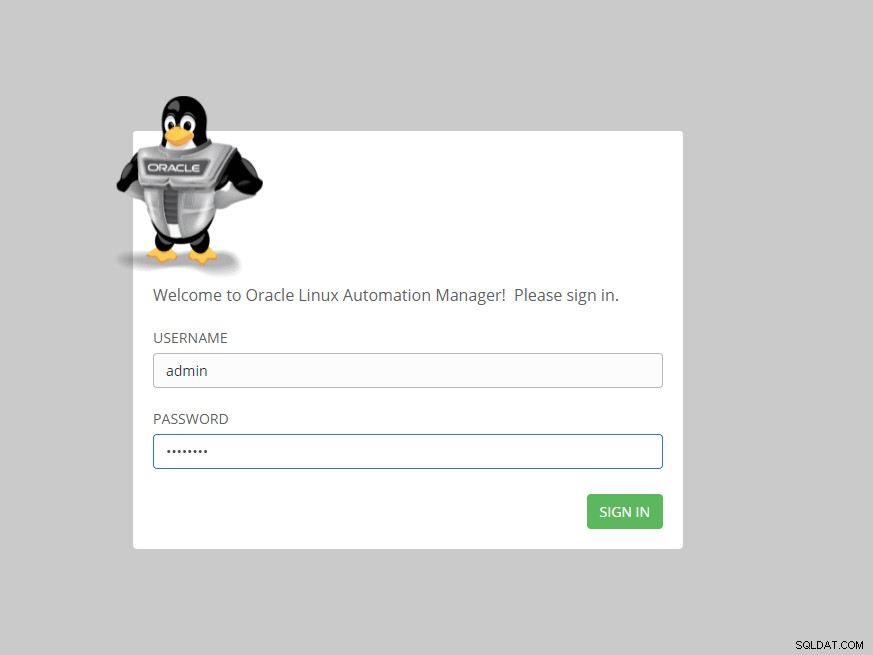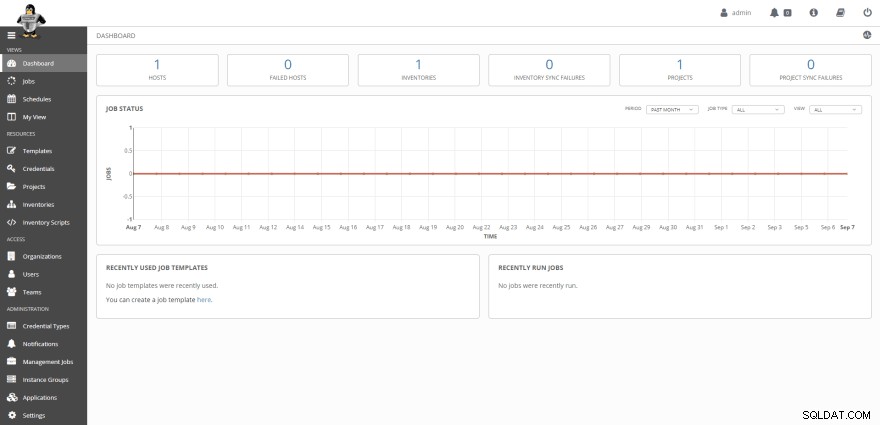Als je de juiste Oracle-mensen volgt, weet je waarschijnlijk al dat Oracle zojuist Oracle Linux Automation Manager heeft uitgebracht:
Uw #Ansible-automatiseringsengine is er misschien al, inbegrepen bij uw Oracle Linux-abonnement... https://t.co/RPZw37yOvs pic.twitter.com/aQZInFcUsv
— Ludovico Caldara (@ludodba) 6 september 2021Ik had begrepen dat toegang ertoe ULN-toegang vereiste, dus er was geen manier om gewoon een snelle VM thuis te draaien en het uit te proberen... maar ik had het mis.
Zoals bevestigd door Ludovico, is er openbare toegang:
Ik heb misschien te vroeg gepraat, het lijkt erop dat er ook een openbare repo beschikbaar is:https://t.co/XxZhs9oFDi
— Ludovico Caldara (@ludodba) 7 september 2021
Ik dacht dat ik het voorlopig simpel zal houden, dus ik heb zojuist een VM gemaakt met Vagrant en bevestig dat je het vanuit huis kunt testen vanuit die openbare repository.
Voeg eerst de openbare repository van Automation toe aan uw systeem en schakel deze in:
[root@OracleAuto ~]# dnf config-manager --add-repo https://yum.oracle.com/repo/OracleLinux/OL8/automation/x86_64
Adding repo from: https://yum.oracle.com/repo/OracleLinux/OL8/automation/x86_64
[root@OracleAuto ~]# dnf repolist
repo id repo name
ol8_UEKR6 Latest Unbreakable Enterprise Kernel Release 6 for Oracle Linux 8 (x86_64)
ol8_appstream Oracle Linux 8 Application Stream (x86_64)
ol8_baseos_latest Oracle Linux 8 BaseOS Latest (x86_64)
yum.oracle.com_repo_OracleLinux_OL8_automation_x86_64 created by dnf config-manager from https://yum.oracle.com/repo/OracleLinux/OL8/automation/x86_64
[root@OracleAuto ~]# dnf config-manager --set-enabled yum.oracle.com_repo_OracleLinux_OL8_automation_x86_64
[root@OracleAuto ~]# dnf update
created by dnf config-manager from https://yum.oracle.com/repo/OracleLinux/OL8/automation/x86_64 108 kB/s | 437 kB 00:04
Last metadata expiration check: 0:00:01 ago on Tue 07 Sep 2021 07:35:18 PM UTC.
Dependencies resolved.
=====================================================================================================================================================================
Package Architecture Version Repository Size
=====================================================================================================================================================================
Installing:
kernel-uek x86_64 5.4.17-2102.204.4.4.el8uek ol8_UEKR6 66 M
Upgrading:
NetworkManager x86_64 1:1.30.0-10.0.1.el8_4 ol8_baseos_latest 2.6 M
NetworkManager-libnm x86_64 1:1.30.0-10.0.1.el8_4 ol8_baseos_latest 1.8 M
btrfs-progs x86_64 5.12.1-1.el8 ol8_UEKR6 858 k
dhcp-client x86_64 12:4.3.6-44.el8_4.1 ol8_baseos_latest 318 k
dhcp-common noarch 12:4.3.6-44.el8_4.1 ol8_baseos_latest 207 k
dhcp-libs x86_64 12:4.3.6-44.el8_4.1 ol8_baseos_latest 148 k
dmidecode x86_64 1:3.2-8.0.2.el8 ol8_baseos_latest 92 k
[....]
nvme-cli-1.12-4.el8_4.x86_64 openldap-2.4.46-17.el8_4.x86_64 oraclelinux-release-el8-1.0-19.el8.x86_64
procps-ng-3.3.15-6.0.1.el8.x86_64 python3-firewall-0.8.2-7.0.1.el8_4.noarch python3-rpm-4.14.3-14.el8_4.x86_64
rpm-4.14.3-14.el8_4.x86_64 rpm-build-libs-4.14.3-14.el8_4.x86_64 rpm-libs-4.14.3-14.el8_4.x86_64
rpm-plugin-selinux-4.14.3-14.el8_4.x86_64 rpm-plugin-systemd-inhibit-4.14.3-14.el8_4.x86_64 rsyslog-8.1911.0-7.0.1.el8_4.2.x86_64
selinux-policy-3.14.3-67.0.6.el8_4.1.noarch selinux-policy-targeted-3.14.3-67.0.6.el8_4.1.noarch systemd-239-45.0.2.el8_4.3.x86_64
systemd-libs-239-45.0.2.el8_4.3.x86_64 systemd-pam-239-45.0.2.el8_4.3.x86_64 systemd-udev-239-45.0.2.el8_4.3.x86_64
virt-what-1.18-9.el8_4.x86_64
Installed:
kernel-uek-5.4.17-2102.204.4.4.el8uek.x86_64
Complete!
[root@OracleAuto ~]#
Nadat we het systeem hebben bijgewerkt, kunnen we zoeken naar het automatiseringsbeheerpakket
[root@OracleAuto ~]# dnf search automation-manager
Last metadata expiration check: 0:07:57 ago on Tue 07 Sep 2021 07:35:18 PM UTC.
================================================================= Name Matched: automation-manager ==================================================================
ol-automation-manager.src : Oracle Linux Automation Manager, based on AWX, provides a web-based user interface, REST API, and task engine built on top of Ansible.
ol-automation-manager.x86_64 : Oracle Linux Automation Manager, based on AWX, provides a web-based user interface, REST API, and task engine built on top of Ansible.
oraclelinux-automation-manager-release-el8.src : Oracle Linux Automation Manager yum repository configuration
oraclelinux-automation-manager-release-el8.x86_64 : Oracle Linux Automation Manager yum repository configuration
[root@OracleAuto ~]#
De installatie van het automatiseringspakket is vrij eenvoudig (uiteraard voor een standaard-/testconfiguratie) en u kunt hieronder een voorbeeld zien dat is gekopieerd uit de Oracle-documentatie:
Oracle Linux Automation Manager installeren
[root@OracleAuto ~]# dnf install ol-automation-manager
Last metadata expiration check: 0:09:39 ago on Tue 07 Sep 2021 07:35:18 PM UTC.
Dependencies resolved.
=====================================================================================================================================================================
Package Architecture Version Repository Size
=====================================================================================================================================================================
Installing:
ol-automation-manager x86_64 1.0.0-1.el8 yum.oracle.com_repo_OracleLinux_OL8_automation_x86_64 67 M
Installing dependencies:
aajohan-comfortaa-fonts noarch 3.001-2.el8 ol8_baseos_latest 148 k
ansible noarch 2.9.23-1.el8 yum.oracle.com_repo_OracleLinux_OL8_automation_x86_64 17 M
bzip2 x86_64 1.0.6-26.el8 ol8_baseos_latest 60 k
checkpolicy x86_64 2.9-1.el8 ol8_baseos_latest 346 k
emacs-filesystem noarch 1:26.1-5.el8 ol8_baseos_latest 69 k
fontconfig x86_64 2.13.1-3.el8 ol8_baseos_latest 274 k
fontpackages-filesystem noarch 1.44-22.el8 ol8_baseos_latest 16 k
gd x86_64 2.2.5-7.el8 ol8_appstream 144 k
[...]
redis-5.0.3-2.module+el8.0.0.z+5250+19ca22c8.x86_64 sos-4.0-11.0.1.el8.noarch
sshpass-1.06-9.el8.x86_64 supervisor-4.2.2-1.el8.noarch
uwsgi-2.0.18-4.0.1.el8.x86_64 xmlsec1-1.2.25-4.el8.x86_64
xmlsec1-openssl-1.2.25-4.el8.x86_64
Complete!
[root@OracleAuto ~]#
Vervolgens moeten we de configuratie instellen met AWX-gebruiker.
Nogmaals, volg gewoon het documentatievoorbeeld:
[root@OracleAuto ~]# cat /etc/redis.conf
[...]
unixsocket /var/run/redis/redis.sock
unixsocketperm 775
[root@OracleAuto ~]# /var/lib/ol-automation-manager/ol-automation-manager-DB-init.sh
* Initializing database in '/var/lib/pgsql/data'
* Initialized, logs are in /var/lib/pgsql/initdb_postgresql.log
Database pre-setup is completed
[root@OracleAuto ~]#
[root@OracleAuto ~]# su -l awx -s /bin/bash
[awx@OracleAuto ~]$ awx-manage migrate
Operations to perform:
Apply all migrations: auth, conf, contenttypes, main, oauth2_provider, sessions, sites, social_django, sso, taggit
Running migrations:
Applying contenttypes.0001_initial... OK
Applying contenttypes.0002_remove_content_type_name... OK
Applying taggit.0001_initial... OK
Applying taggit.0002_auto_20150616_2121... OK
Applying auth.0001_initial... OK
Applying main.0001_initial... OK
Applying main.0002_squashed_v300_release... OK
Applying main.0003_squashed_v300_v303_updates... OK
Applying main.0004_squashed_v310_release... OK
Applying conf.0001_initial... OK
Applying conf.0002_v310_copy_tower_settings... OK
Applying main.0005_squashed_v310_v313_updates... OK
Applying main.0006_v320_release... OK
Applying main.0007_v320_data_migrations... OK
Applying main.0008_v320_drop_v1_credential_fields... OK
Applying main.0009_v322_add_setting_field_for_activity_stream... OK
[....]
Applying social_django.0002_add_related_name... OK
Applying social_django.0003_alter_email_max_length... OK
Applying social_django.0004_auto_20160423_0400... OK
Applying social_django.0005_auto_20160727_2333... OK
Applying social_django.0006_partial... OK
Applying social_django.0007_code_timestamp... OK
Applying social_django.0008_partial_timestamp... OK
Applying sso.0001_initial... OK
Applying sso.0002_expand_provider_options... OK
Applying taggit.0003_taggeditem_add_unique_index... OK
Laten we nu de beheergebruiker maken en ervoor zorgen dat u de juiste hostnaam/IP-adres instelt voor de "AWX-instantievoorziening"
[awx@OracleAuto ~]$ awx-manage createsuperuser --username admin
Email address: admin@test.com
Password:
Password (again):
Superuser created successfully.
[awx@OracleAuto ~]$
[awx@OracleAuto ~]$ awx-manage create_preload_data
Default organization added.
Demo Credential, Inventory, and Job Template added.
(changed: True)
[awx@OracleAuto ~]$ awx-manage provision_instance --hostname=OracleAuto
Successfully registered instance OracleAuto
(changed: True)
[awx@OracleAuto ~]$ awx-manage register_queue --queuename=tower --hostnames=OracleAuto
Creating instance group tower
Added instance OracleAuto to tower
(changed: True)
[awx@OracleAuto ~]$
[awx@OracleAuto ~]$ exit
logout
Zodra dat is voltooid, moeten we de HTTP-server instellen.
Aangezien dit slechts een test is, kunt u gewoon een ssl-certificaat maken om problemen met inloggen op uw beheerinterface te voorkomen (doe dit alstublieft niet op uw productiesysteem :))
[root@OracleAuto ~]# openssl req -x509 -nodes -days 365 -newkey rsa:2048 -keyout /etc/tower/tower.key -out /etc/tower/tower.crt
Generating a RSA private key
......+++++
.+++++
writing new private key to '/etc/tower/tower.key'
-----
You are about to be asked to enter information that will be incorporated
into your certificate request.
What you are about to enter is what is called a Distinguished Name or a DN.
There are quite a few fields but you can leave some blank
For some fields there will be a default value,
If you enter '.', the field will be left blank.
-----
Country Name (2 letter code) [XX]:
State or Province Name (full name) []:
Locality Name (eg, city) [Default City]:
Organization Name (eg, company) [Default Company Ltd]:
Organizational Unit Name (eg, section) []:
Common Name (eg, your name or your server's hostname) []:
Email Address []:
[root@OracleAuto ~]#
Ik weet zeker dat je de webserver naar je favoriete kunt veranderen, maar voor nu zullen we de nginx-server instellen die de standaardserver is.
Hier hebben we zojuist een back-up gemaakt van de standaardconfiguratie en de standaardconfiguratie gekopieerd uit de documentatie:
[root@OracleAuto ~]# mv /etc/nginx/nginx.conf /etc/nginx/nginx.conf.bk
[root@OracleAuto ~]# nano /etc/nginx/nginx.conf
[root@OracleAuto ~]# cat /etc/nginx/nginx.conf
user nginx;
worker_processes auto;
error_log /var/log/nginx/error.log;
pid /run/nginx.pid;
# Load dynamic modules. See /usr/share/doc/nginx/README.dynamic.
include /usr/share/nginx/modules/*.conf;
events {
worker_connections 1024;
}
http {
log_format main '$remote_addr - $remote_user [$time_local] "$request" '
'$status $body_bytes_sent "$http_referer" '
'"$http_user_agent" "$http_x_forwarded_for"';
access_log /var/log/nginx/access.log main;
sendfile on;
tcp_nopush on;
tcp_nodelay on;
keepalive_timeout 65;
types_hash_max_size 2048;
include /etc/nginx/mime.types;
default_type application/octet-stream;
# Load modular configuration files from the /etc/nginx/conf.d directory.
# See https://nginx.org/en/docs/ngx_core_module.html#include
# for more information.
include /etc/nginx/conf.d/*.conf;
}
[root@OracleAuto ~]#
Laatste stappen, verander gewoon wat informatie over het toreninstellingenbestand (voeg gewoon uw hostnaam/IP toe aan CLUSTER_HOST_ID) en activeer/start de Oracle Automation Manager Service met Systemd
[root@OracleAuto ~]# grep -i CLUSTER_HOST_ID /etc/tower/settings.py
CLUSTER_HOST_ID = "OracleAuto"
[root@OracleAuto ~]#
[root@OracleAuto ~]# systemctl enable --now ol-automation-manager.service
Created symlink /etc/systemd/system/multi-user.target.wants/ol-automation-manager.service → /usr/lib/systemd/system/ol-automation-manager.service.
[root@OracleAuto ~]#
En voila! u kunt nu beginnen met het rechtstreeks beheren van uw ansible-playbooks vanuit de Oracle Automation Manager Interface


Ik moet echt meer in Ansible en automatisering komen, dus dit zou een goede manier kunnen zijn om Oracle's eigen automatiseringsmanager te gaan gebruiken :)
